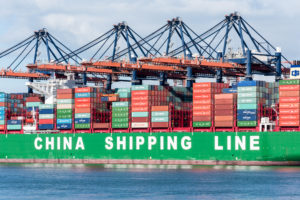 The American consumer is the backbone of the economy. It is their insatiable appetite for products that spins off into income for thousands of other businesses including such far-fetched markets as real estate. When they go to the store or shop online, they see finished goods waiting for their bucks.
The American consumer is the backbone of the economy. It is their insatiable appetite for products that spins off into income for thousands of other businesses including such far-fetched markets as real estate. When they go to the store or shop online, they see finished goods waiting for their bucks.
After a few generations of uninterrupted supply, they begin to not only take the bounty of finished products for granted, but they have actually forgotten where the parts for all that stuff come from.
In the 1970’s and 80’s we saw a mass exodus of manufacturing to the lowest bidder, mostly China. Now most of the parts and many of the raw materials come from China. It seemed perfect. They would work for less, oceanic trade would increase, and Americans would see lower prices. But lower price at what cost?
Fast forward 30 years and the US economy is dependent on the Chinese supply chain. But the Chinese continue with traditional live-animal markets like they have for centuries. The viruses can easily jump from animals to humans, only now, those humans are making the parts to the stuff Americans consume.
What happens when folks don’t show up for work because they are sick or quarantined? The supply chain begins to grind to a halt. As that happens, investors back off the markets as they fear lack of supply resulting in reduced sales. Pretty soon, the shelves begin to empty, and the supply chain stops!
So regardless of what your politics are, economically we are dependent on the health and welfare of the Chinese workers. This will soon be quite obvious. So what’s the lesson here? Are there risks that “the lowest bidder” for labor may come with cultural traditions that are problematic in an increasingly overpopulated, interdependent, and mobile world? Are the risks not just to the supply chain, but to overall global health? Once again, isolationism has no place in the modern world.
We are business advocates. Business can only survive with dependable supply chains. Once a virus begins to affect the supply chain, companies risk losing everything they have gained by going to “the lowest bidder.”
Sometimes the true costs of “lowest bidder” labor are hidden until one day they present themselves. Having all your eggs in one basket is never a good idea for any producer and marketer. Once you lose your shelf space, it’s almost impossible to get back in. The producers with diversified supply chains are in a better position to keep their products on the shelf.
It’s just plain not good business to think that you can outsource labor without ultimately paying the consequences in supply disruption and health. It’s just pain good business to take an active interest in the health and welfare of the world, especially the countries you depend upon.
We hope for all our sakes that we develop the vaccine and treatments that will be effective against the corona virus. And we hope this experience teaches us all a lesson about the interdependency of the world!
